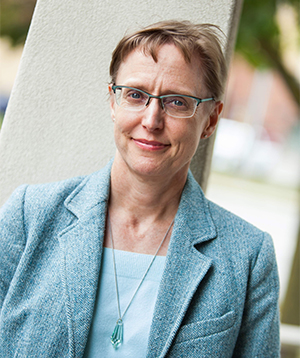Your IMPACT
It takes a special person to be able to help new patients at the First Episode Mood and Anxiety Program (FEMAP) open up about their mental health.
Asha Howard is that individual — the friendly, calm and cool social worker who will build trust with new patients, relating to them on a personal level with her easy ability to put herself in others’ shoes. Her unique approach helps youth go from scared and withdrawn to open and relaxed.
Asha’s vital role as intake social worker is 100 per cent donor funded. More than 140 patients per year go through an intake meeting with Asha before starting treatment, where she’ll speak to them for up to two hours to get to know who they are: their background, family life, concerns, and hopes for the future.
“I don’t know anywhere else that offers a one-to-two hour intake assessment, but it is critically important,” Asha says. “How can you make treatment recommendations for a person after one questionnaire and a quick chat? Mental illness requires a holistic understanding of the person. I love that FEMAP embraces this comprehensive level of care.”
After the much-important first meeting, Asha will take her assessment to the FEMAP team of psychiatrists and psychologists, and together, they map out the best treatment path based on peer-reviewed research and the individual’s unique needs.
“FEMAP is unique in that there are no set number of appointments,” Asha explains. “In most cases, we won’t stop seeing them until patients feel confident they have the tools they need to manage their mental health. We’re preventing people from experiencing chronic mental illness because our treatment intervenes at an age when their brain is still developing, so we have the potential to really make an impact.”
Sometimes young people come to FEMAP and require immediate interventions, meaning that putting them on the waitlist could be a detriment to their safety and well-being. Asha is there to help. She is trained in crisis management and psychotherapy, and can offer that to them briefly for a few sessions while they’re waiting to see a psychiatrist, and connects them to other services in the community that can help.
Asha also facilitates therapy groups including a stabilization group for patients who have experienced trauma and a group for anxiety management. Through these groups, she’s able to see dramatic transformations as patients journey through their treatment.
“When I see a person go from struggling to thriving, it’s incredibly rewarding,” Asha says. “I’ve had patients who barely spoke or who couldn’t make eye contact during the intake assessment. Within a few months, they’re cracking jokes and telling me about all the amazing things they’re doing
with their lives.”
Asha’s role, like all the others at FEMAP, would not exist without donor funding. “I’m unbelievably thankful that there are so many selfless and compassionate people in our community who believe in our program, and this inspires our entire team every day.”
The COVID-19 pandemic has not slowed down Asha and the FEMAP team. They are currently researching the effects of the pandemic on youth mental health to ultimately provide evidence-based care designed to specifically support young people during these times.
“Now, more than ever, we need to direct limited mental health resources to the right places, at the right time,” says FEMAP founder and Lawson scientist Dr. Elizabeth Osuch. “This research helps identify the most vulnerable so that we can help them get back to good mental health in a timely way."

Thank you to our donors for supporting essential mental health care through FEMAP.
